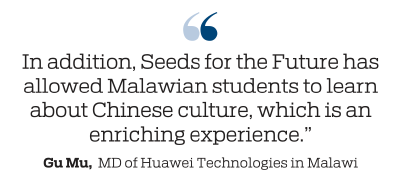
BLANTYRE, Malawi — Seeds for the Future, a youth empowerment program founded by Chinese tech giant Huawei has become a game changer for young people in Malawi.
Since 2017, Huawei has managed to train 190 students in Malawi by equipping them with various skills, knowledge and information to succeed in a fast-changing world using information and communication technology (ICT).
For Martin Manyozo, 24, who attended the program in 2022, the initiative has given him a wider perspective on solving various social problems in his community using ICT and various social skills.
Manyozo, who lives in Malawi's commercial city of Blantyre, is a business administration student at Malawi University of Business and Applied Science.
"Seeds for the Future program has helped me in many ways: I learned how to network with other people, how to build business relationships, leadership, and the use of technology in business. These things have enabled me to progress further in my day-to-day business," he told Xinhua in an interview.
"As a business administration student, I never knew that I would use ICT as a tool to develop and implement various projects, but after attending the program I realized that there is more to ICT," he added.
The young man is currently co-running a youth-empowering organization known as "Creative Minds" that helps young people with various social skills, including entrepreneurship, financial literacy, and ICT skills to explore their potential.
Manyozo believed that ICT skills are essential in changing social problems in Malawi.
"During the training, we were also encouraged to do our very best for the government rather than expecting the government to do lots for us," continued Manyozo.
"As someone who is geared to change the community that I live in, I use skills which I gained from the training to implement this project including the use of ICT to engage my fellow youths."
Evans Makawa, now the owner and founder of a consultancy business called Mac-Hour multimedia, has also benefited from the Huawei program through some books that a friend, who attended the program in 2020, gave him as a gift.
In an interview with Xinhua, Makawa said since he started reading one of these books, his perception for business has risen to a higher level.
"My favorite story was one by Hu Wei who narrated in the book how he worked hard, and against all odds, penetrated into the industry by creating competitive products," explained Makawa.
"I was inspired by the idea that hard work and dedication can always bring a positive impact when things seem to be impossible," he added.
Makawa, who has a registered multimedia company with three employees, hopes to grow a reliable creative company in Malawi.
"ICT skills are essential to every business, especially during this time when everything is going digital. As a creative company, we use ICT expertise every day in times of developing ideas and execution."
Gu Mu, managing director of Huawei Technologies in Malawi, believes that the program has made a significant impact on local talent, mainly because of how the youth have been exposed to current trends in the ICT sector.
The program has also enabled the Malawian youths to exchange knowledge with other students that are making wonderful innovations across the globe, according to Gu.
"As a result of the program, several beneficiaries have pursued entrepreneurship and started businesses," Gu told Xinhua through a questionnaire.
"In addition, Seeds for the Future has allowed Malawian students to learn about Chinese culture, which is an enriching experience."
"The students have also been able to get globally acclaimed Huawei certifications and this gives them an advantage in terms of increasing their employability."
Gu also noted that Huawei's literature contains essential information for young people to embrace entrepreneurship and become even more enterprising in many things.
"Tian Tao and Yin Zhifeng have been doing a commendable job in terms of telling Huawei stories across the globe," Gu said.
"That literature often brings out the human face of Huawei and its unique challenges and strengths," Gu added.
He further observed that at the time the job market is declining, the books can act as a guide to young people looking to make their way in the world of business, in particular, starting up their own enterprises.
Huawei has, for the past years, done several projects with the Malawian government, including the implementation of the National Data Center initiative, and the National Optic Fibre Backbone that is now in phase II.
Xinhua
